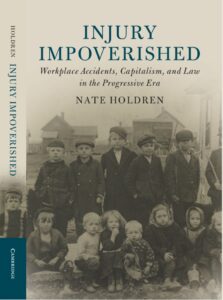Nate Holdren, assistant professor of law, politics, and society, recently published his first book, Injury Impoverished: Workplace Accidents, Capitalism, and Law in the Progressive Era. The book, published in the Cambridge University Press series Historical Studies in American Law and Society, examines the creation and early operation of workers’ compensation laws in the early twentieth century United States.

Injury Impoverished combines archival research, critical theory, gender- and disability-analysis, and compelling narration. The book argues that reforms to employee injury law created new forms of inequality, by causing people with disabilities to lose their jobs, as well as new forms of inhumanity, by treating deeply personal suffering and losses in an impersonal and economic manner. University of Chicago historian Jonathan Levy describes the book as “brilliantly argued, and a gripping, at times haunting reading. A history of moral imagination, it is a work of moral imagination itself.” In a review at the legal journal Jotwell, Emory University Law Professor Deborah Dinner calls the book “essential reading for historians of labor and capitalism,” adding that “Injury Impoverished has given me a new critical lens on workers’ compensation, which I will bring to the classroom the next time I teach employment law.” The book takes on new relevance in the light of current events, as legislators consider laws to restrict employers’ liability for employee injuries at a time when COVID-19 joins the army of occupational hazards that create America’s annual toll of nearly 3 million serious workplace injuries and five thousand workplace deaths.
In the month of July, Holdren will be blogging at The Legal History Blog about the book, his writing process, and what it was like to write the book as a first generation scholar. For more on the book, see Professor Dinner’s review and the Cambridge University Press.

